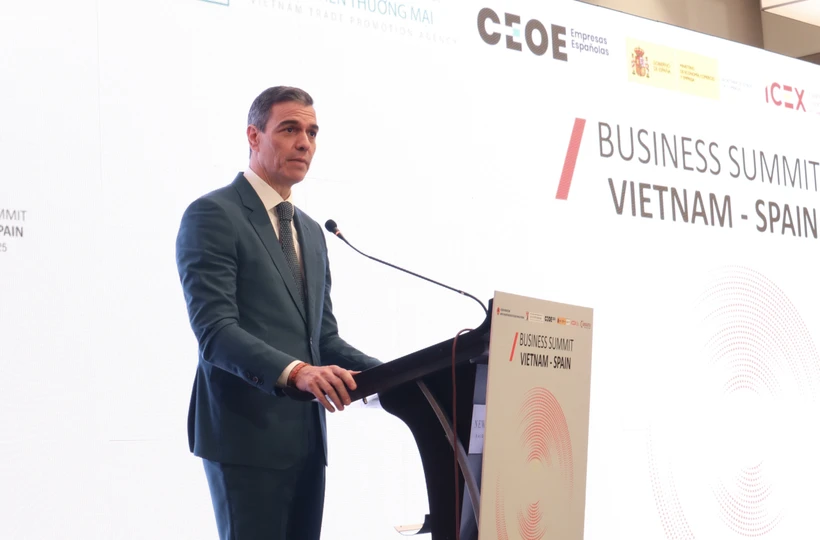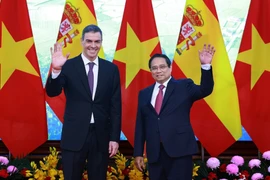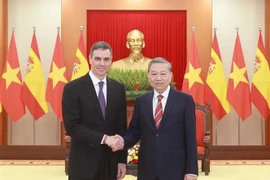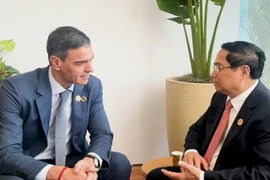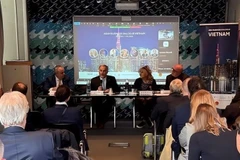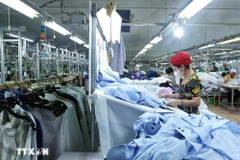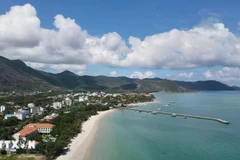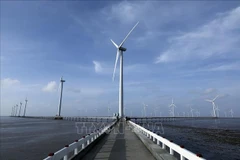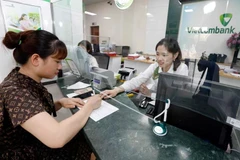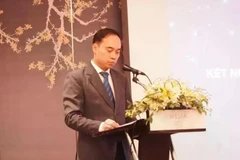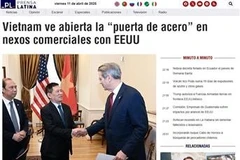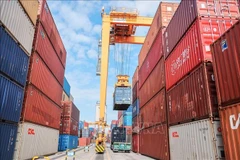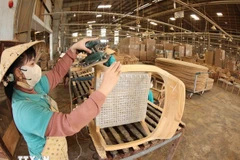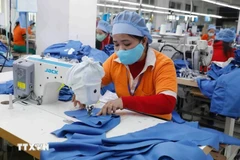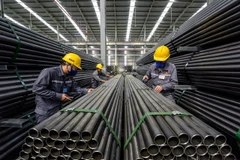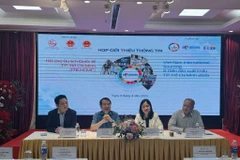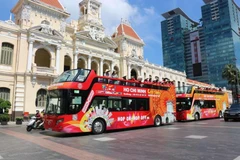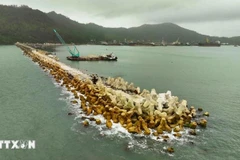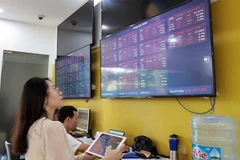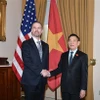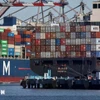HCM City (VNA) - Spain and Vietnam see ample room for comprehensive cooperation in areas such as trade, investment, tourism, science and technology, and cultural exchanges, and both need to take actions to transform this potential into effective collaborations, contributing to strengthening bilateral ties and fostering prosperity between the EU and ASEAN regions, according to Spanish Prime Minister Pedro Sánchez.
Addressing the Vietnam-Spain Business Summit held in Ho Chi Minh City on April 10 within the framework of his official visit to Vietnam, PM Sánchez said that in 2009, Spain became the first country in the European Union (EU) to establish a Strategic Partnership with Vietnam. Since then, bilateral economic cooperation has continually developed. Notably, in a short period from 2020 to 2024, bilateral trade turnover more than doubled.
Vietnam is a dynamic and rapidly developing economy, with a growth rate exceeding 7% in 2024, a figure that not many countries could achieve amidst numerous fluctuations and challenges, he stated, affirming that Spain wishes to become an active partner in Vietnam's goal of modernisation and becoming a high-income developed nation by 2050.
With strengths in industry, energy, transportation infrastructure, and especially metro systems, Spanish companies can actively participate in Vietnam's strategic projects, he proposed.
Phan Thi Thang, Deputy Minister of Industry and Trade, affirmed that Spain has always been an important partner of Vietnam in both the region and the world. Trade between the two countries has continuously grown over the years, reaching 4.7 billion USD in 2024, making Spain Vietnam's 5th largest trading partner in the EU. Meanwhile, Vietnam is Spain's largest trading partner in ASEAN.
However, economic, trade, and investment relations are still not commensurate with the potential and strengths of both countries, as two-way trade only accounts for 0.7% of Spain's total trade turnover and 0.6% of Vietnam's. The European nation's investment in Vietnam also remains modest as it ranks 46th among 147 countries and territories pouring capital into the Southeast Asian nation, Thang said, adding that there remains ample room for bilateral economic, trade, and investment collaboration.
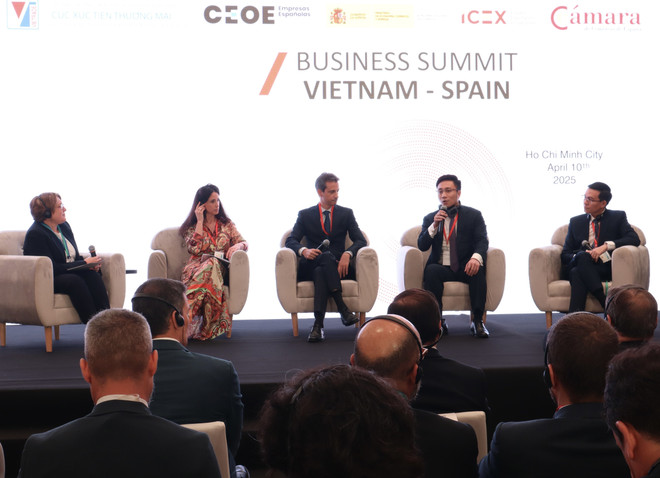
According to the deputy minister, Vietnam and Spain are two economies with many complementary advantages. Vietnam is the third-largest economy in ASEAN and the 32nd largest in the world, ranking in the top 20 in international trade and top 15 in attracting foreign direct investment (FDI). With a stable political environment, high economic growth, open trade and investment policies, and competitive production costs, Vietnam is becoming an attractive destination for Spanish businesses. On the other hand, with its strengths in energy, materials, resources, and technology, Spain is an important option in the strategy of optimising global supply chains for Vietnamese businesses.
The EU- Vietnam Free Trade Agreement (EVFTA), with nearly all tariff lines reduced to zero over a period of 7-10 years, is a significant leverage for bilateral trade.
Moreover, Vietnam and Spain are strategically located at the gateways of Asia and Europe, serving as bridges between the two most dynamic economic regions in the world. Vietnamese goods entering Spain target the nearly 500 million people in the EU market, while Spanish businesses in Vietnam can access the nearly 700-strong ASEAN market, as well as the market of nearly 6 billion consumers across 17 bilateral and multilateral free trade agreements of which Vietnam is a member, said Thang.
Vietnam and Spain are preparing for the first meeting of the Joint Committee on Economic, Trade and Investment Cooperation, a key mechanism for reviewing bilateral collaboration, identifying priority areas, and supporting businesses from both countries in exploring each other’s markets.
Thang noted that areas of both sides' strength and demand include food processing, textiles, leather and footwear, mechanical engineering, transport infrastructure, logistics services, tourism, renewable and clean energy for sustainable development.
Vice Chairman of the Ho Chi Minh City People’s Committee Bui Xuan Cuong said Spain remains one of the city’s important trade and investment partners. In 2024, trade between the city and Spain reached nearly 412 million USD. Spain currently has 44 investment projects in the city with a total registered capital of 16.2 million USD.
HCM City aims to achieve double-digit growth in 2025, and by 2045, become a smart city and a leading economic, financial, and service hub in Asia, and an attractive destination for global investors, he said, adding the city is actively seeking investment in key areas such as high technology, transport infrastructure, health care, education, culture and sports, environment, and trade and services.
Notable ongoing projects include the development of an international financial centre, the construction of a 355km urban railway system integrated with urban development under the Transit Oriented Development (TOD) model, the Can Gio international transshipment port, a large-scale data centre, and facilities for manufacturing electronic components and semiconductors.
To realise these goals, the city welcomes cooperation and companionship from Spanish businesses and investors, particularly in fields such as transport infrastructure, renewable energy, food processing, tourism, and digital transformation.
HCM City is committed to creating favourable conditions for Spanish and European enterprises to expand their presence, contributing to the building of efficient, flexible, and sustainable supply chains, not only in Vietnam but across the ASEAN region, Cuong said.
Emma Antolín Granet, Vice President of car interiors manufacturer Antolín, highlighted the company’s decision to invest in an automotive component manufacturing plant in Vietnam and partner with VinFast as a successful investment model. She praised Vietnamese enterprises, including VinFast, for their dynamism, innovation, and alignment with Antolín’s sustainability goals.
Meanwhile, Triet Luu, Co-founder and R&D Lead at Impact Technical Resources (ITR), said the company has collaborated with Spanish tech startup Mjn-neuro, which develops AI-integrated medical devices for epilepsy prediction. This partnership, he said, is a result of the combination of Spain’s strength in scientific research and Vietnam’s engineering design capabilities.
According to Luu, science-technology is a shared priority for both governments - a favourable condition for the two countries' business communities to forge technology alliances serving not only economic and trade purposes but also public health and sustainable development./.
